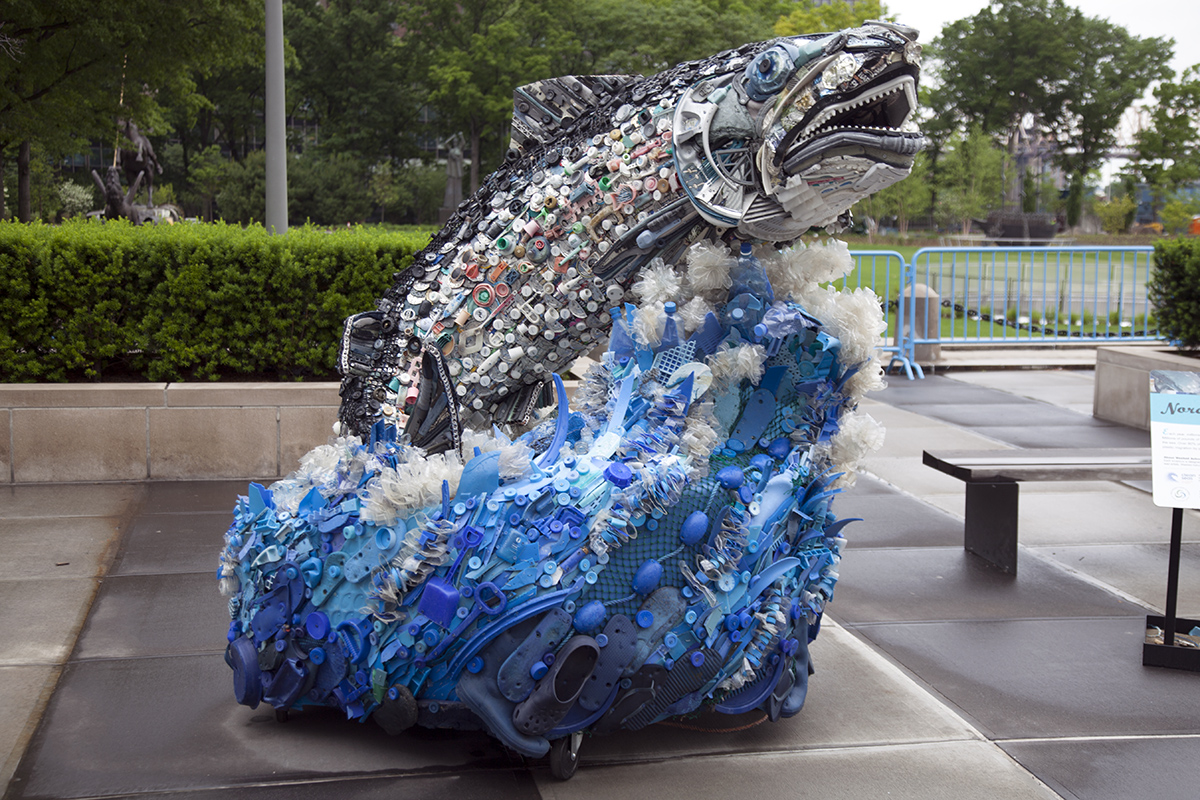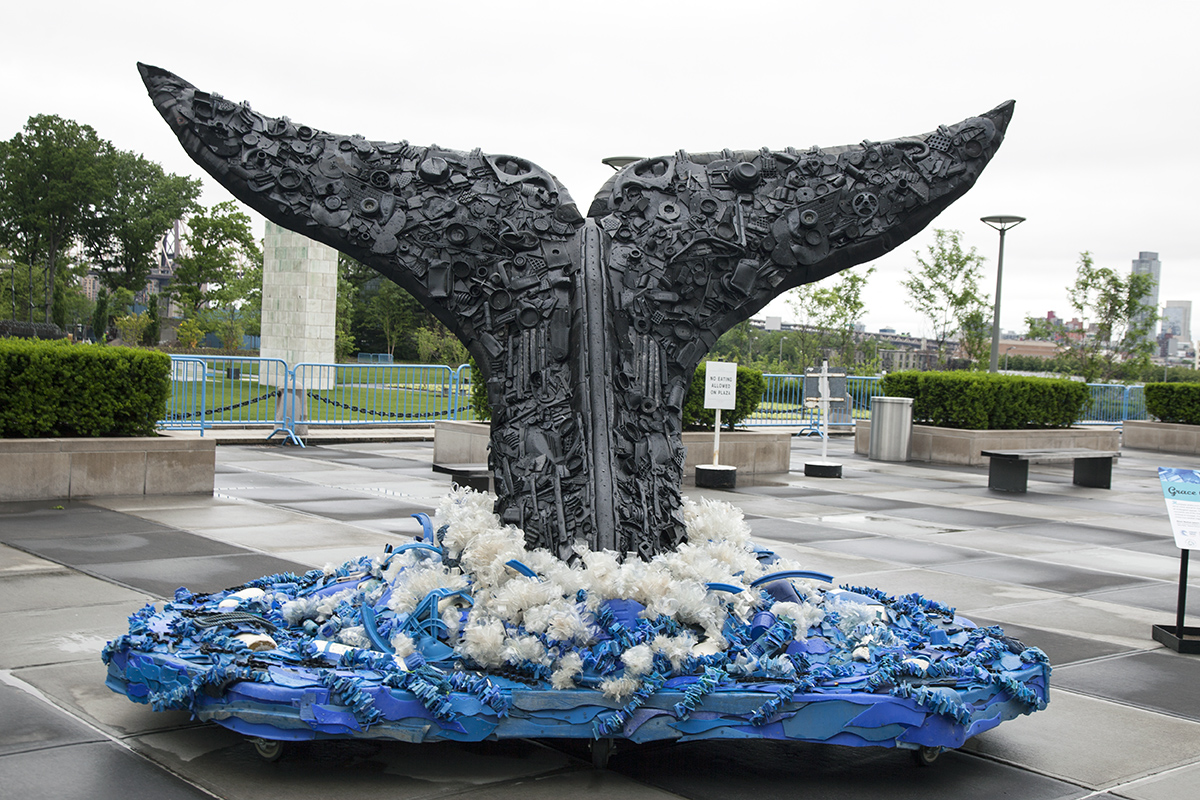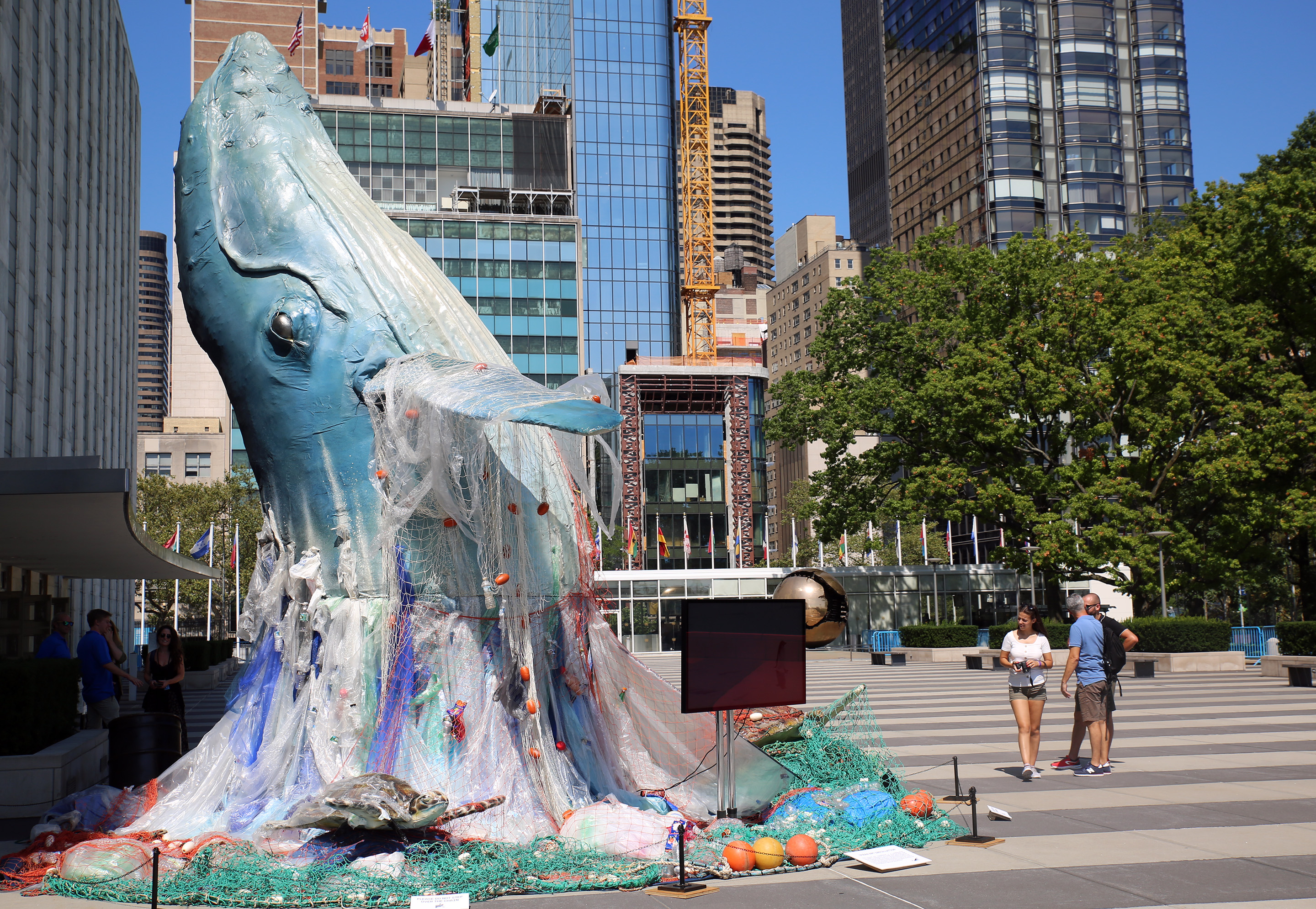4th Meeting of the Ad-hoc Open-ended Expert Group on Marine Litter and Microplastics (AHEG-4)
9-13 November 2020 | Online
Summary Highlights of the Meeting
Delegates attending the fourth meeting of the ad-hoc open-ended expert group on marine litter and microplastics discussed and agreed on a Chair’s Summary to inform the fifth meeting of the United Nations Environment Assembly (UNEA-5) on how best to tackle marine litter and microplastics. In their consideration of the Chair’s Summary, they engaged in robust discussions on how to reflect what seemed like an emerging convergence around the need for a new global treaty. While many supported calls for the document to signal to the Assembly that the time has come to establish an intergovernmental negotiating committee to begin talks on a new treaty, others differed. In the end, they agreed to the Chair’s summary, which was hailed as a neutral and factual document, containing a non-exhaustive list of response options to marine litter and microplastics. They annexed the summary to the report of the meeting, which will be presented to delegates at UNEA-5. This meeting concluded the AHEG’s work, with the experts having completed the mandate accorded to them by UNEA.
The ENB Summary and Analysis of AHEG-4 is available in HTML and PDF format.
Highlights for Friday, 13 November 2020

 On Friday, the ad-hoc open-ended expert group on marine litter and microplastics met for the last time. They heard from Inger Andersen, Executive Director of the UN Environment Programme, who outlined that addressing marine pollution was a key part of the Programme’s medium-term strategy to be discussed in 2021. She underlined that, as the expert group was completing its mandate, the momentum built towards action on marine litter and microplastics would be carried forward through the further development of the Global Partnership on Marine Litter.
On Friday, the ad-hoc open-ended expert group on marine litter and microplastics met for the last time. They heard from Inger Andersen, Executive Director of the UN Environment Programme, who outlined that addressing marine pollution was a key part of the Programme’s medium-term strategy to be discussed in 2021. She underlined that, as the expert group was completing its mandate, the momentum built towards action on marine litter and microplastics would be carried forward through the further development of the Global Partnership on Marine Litter.
The group then considered a revised draft of the Chair’s summary, which is the main outcome of the entire expert group process. Chair Satoru Iino (Japan) described the revisions, noting that they were a reflection of discussions held on Thursday and constituted his approach to presenting a neutral and factual summary to inform the fifth session of the UN Environment Assembly. Several delegations expressed their support for the revised draft, with some providing further suggestions for textual amendments to better reflect their positions and discussions. Delegates supported the summary as a balance of views shared during the entire AHEG process, acknowledging that the document was not a negotiated outcome. However, several reiterated their hope that the summary would include stronger language on the need to establish a negotiating process towards a new global agreement on plastic pollution.
With this being the final meeting of the expert group, several delegations reflected on the work done since the group’s inception in May 2018. Delegations welcomed all the progress made in responding to calls from the global community to begin the urgent work of addressing marine litter and microplastics. They also acknowledged the role of the Secretariat in organizing the meetings and preparing the documents on which their discussions were based. For this meeting in particular, many lauded the online platform Interprefy for providing a space for them to participate as fully as possible in the process, albeit through some ongoing technical challenges.
After brief remarks from Susan Gardner, UN Environment Programme, Chair Iino called on delegates to keep working collaboratively to address the marine litter challenge. He closed the meeting at 5:02 pm EAT (UTC +3)
To review the revised Chair’s Summary, please click here.
Images from the Meeting
Videos from the Session
Highlights for Thursday, 12 November 2020

 On the penultimate day of the fourth Meeting of the Ad-hoc Open-ended Expert Group on Marine Litter and Microplastics (AHEG-4), delegates spent the bulk of their time considering the draft Chair’s summary. This summary will inform policy discussions on marine litter and plastic pollution at the next meeting of the United Nations Environment Assembly (UNEA). The seven page summary contains, among other things, a review of the current actions and activities addressing the issue, as well potential options for future work.
On the penultimate day of the fourth Meeting of the Ad-hoc Open-ended Expert Group on Marine Litter and Microplastics (AHEG-4), delegates spent the bulk of their time considering the draft Chair’s summary. This summary will inform policy discussions on marine litter and plastic pollution at the next meeting of the United Nations Environment Assembly (UNEA). The seven page summary contains, among other things, a review of the current actions and activities addressing the issue, as well potential options for future work.
In their vibrant deliberations, many delegations expressed their support for a new global agreement, stressing that this should be adequately reflected in the Chair’s summary. Some noted that, given the importance of the summary in charting the path forward for marine litter and plastic pollution, those issues that garnered convergence should be highlighted rather than obscured. Some delegations also reiterated the requests at this meeting for UNEA to establish an intergovernmental negotiating committee to begin discussions on a new agreement. Other delegations noted that the AHEG discussions have brought to the fore the urgent need for international action, specifically because many voluntary measures on marine litter and plastic pollution are neither inclusive nor global.
Some others, however, were careful to note that the Chair’s summary is not a negotiated text and can thus give equal weight to all the options for further action discussed during the four meetings of the AHEG. Recalling the mandate from UNEA, they underlined the need to allow policy discussions to be conducted under the auspices of the Assembly. Some were also keen to point out that there has been no consensus nor convergence on any one response option.
The draft Chair’s summary is set to be revised to take into account written submissions and elements of Thursday’s discussion, and will be reissued on Friday.
Images from the Meeting
Videos from the Session
Highlights for Wednesday, 11 November 2020

 During their mid-week deliberations, delegates attending the 4th Meeting of the Ad-hoc Open-ended Expert Group on Marine Litter and Microplastics (AHEG-4) spent most of the session discussing response options to the growing marine plastic pollution crisis. Many observed that this crisis is being further exacerbated by excess plastic pollution related to the personal protective equipment (PPE) necessary for the fight against COVID-19.
During their mid-week deliberations, delegates attending the 4th Meeting of the Ad-hoc Open-ended Expert Group on Marine Litter and Microplastics (AHEG-4) spent most of the session discussing response options to the growing marine plastic pollution crisis. Many observed that this crisis is being further exacerbated by excess plastic pollution related to the personal protective equipment (PPE) necessary for the fight against COVID-19.
Delegates heard five presentations on response options from the Nordic Council, Japan, the Pew Charitable Trusts, the World Wide Fund for Nature (WWF), and the Center for International Environmental Law (CIEL). These options, along with those already discussed at previous meetings of the expert group, include, but are not limited to:
- calls for a new global agreement to address plastic pollution;
- calls to strengthen existing global arrangements;
- suggestions to strengthen voluntary and/or other commitments and instruments; and
- preferences for combining and enhancing global, regional and national level actions.
Overcoming technical hiccups, the group had a robust discussion on the various response options to address marine litter and microplastics. Several delegations came out in support of a new global agreement, although there was no convergence on whether this agreement would be legally binding, and on whether it would only address marine litter or go further to address plastic pollution more generally. Many also supported the expansion of existing voluntary agreements, with several pointing to the Osaka Blue Ocean Vision and the G20 Implementation Framework for Actions on Marine Plastic Litter. Others discussed global measures that are already acting on plastic pollution, including the Basel Convention on the Control of Transboundary Movements of Hazardous Wastes and Their Disposal, the Strategic Approach to International Chemicals Management (SAICM), and the International Maritime Organization (IMO). Discussions also addressed the importance of private sector participation, with some delegations noting that the business and philanthropic sectors have already made clear their interest in addressing marine plastic pollution.
Significantly at this session, there were calls for the next meeting of the UN Environment Assembly (UNEA) to mandate an intergovernmental negotiating committee to begin treaty negotiations. Many delegations went a step further and outlined their precise expectations of a new global treaty, with a number stressing that any new treaty should include a transparency mechanism in addition to a financial mechanism and monitoring and reporting systems.
Discussions will continue on Thursday, which will also see delegates engage on the AHEG Chair’s Summary. This Summary will inform discussions at the next substantive session of UNEA and may have broad implications for the world of marine litter and microplastics.
To further explore the presentations on response options made during today’s session, please click here.
Images from the Meeting
Videos from the Session
Highlights for Tuesday, 10 November 2020

 Delegates attending the fourth meeting of the Ad-hoc open-ended expert group on marine litter and microplastics (AHEG-4) met for a second day to continue deliberations, albeit through technical and connectivity challenges. They dived into their work for the day, being chaired by both Chair Satoru Iino (Japan), and Vice Chair Pernilla Ahrlin (Sweden), by discussing a stocktaking exercise of existing activities and actions by all stakeholders to reduce marine litter and microplastics with the aim of the long-term elimination of discharge into the oceans.
Delegates attending the fourth meeting of the Ad-hoc open-ended expert group on marine litter and microplastics (AHEG-4) met for a second day to continue deliberations, albeit through technical and connectivity challenges. They dived into their work for the day, being chaired by both Chair Satoru Iino (Japan), and Vice Chair Pernilla Ahrlin (Sweden), by discussing a stocktaking exercise of existing activities and actions by all stakeholders to reduce marine litter and microplastics with the aim of the long-term elimination of discharge into the oceans.
After an informative presentation by the UN Environment Programme Secretariat, outlining the results of a global survey of activities and actions, delegates also heard about two new platforms to present the stocktake data through an online repository and an interactive dashboard. The secretariat will open the stock-taking survey for submissions until the end of December and update the platform accordingly for UNEA. Welcoming the results of the stocktaking efforts, several delegations stressed the need for a stronger global commitment to eliminate marine litter and microplastics, with others also noting the importance of addressing the sources of marine plastic pollution (or “upstream” actions and measures).
After a short but important discussion on partnerships, delegates briefly considered whether to begin their work on response options to marine litter and microplastics, given the amount of time left to complete the agenda. Chair Iino underlined, supported by some delegations, that each agenda item should be discussed thoroughly, with Iino noting that there would be an entire day’s session dedicated to response options.
The group then began their analysis of the effectiveness of existing and potential response options and activities. The potential response options analyzed include:
- strengthening the existing international framework;
- strengthening regional frameworks;
- ensuring and enhancing global design standards;
- establishing a new international framework; and
- strengthening national microplastics strategies.
Some delegates were concerned about the analysis of the options to address marine litter and microplastics, with a few calling for a less prescriptive approach which would allow countries to choose the option(s) best suited to their specific circumstances. A number of other delegations opined that the analysis made the case for a new international legally binding agreement, with some suggesting that this agreement consider plastic pollution more generally.
Throughout the proceedings, delegates were also encouraged to provide written comment on the draft Chair’s Summary, which is the primary output of this meeting. It will inform the fifth meeting of the UN Environment Assembly, scheduled to be held in two sessions in 2021 and 2022.
To find out more about the day's presentations, click here.
Images from the Meeting
Videos from the Session
Highlights for Monday, 9 November 2020

 On day one, the Expert Group worked through a number of technical challenges to delve into a packed agenda for the week’s meeting on marine litter and microplastics. Due to the pandemic, the meeting is being held virtually. Perhaps because of the new challenges presented by the pandemic, the work of the Ad-Hoc open-ended expert group on marine litter and microplastics is gaining even more importance. These challenges include an increase in the use of single-use protective personal equipment (PPE), such as masks and gloves, particularly as many parts of the world have entered into a second wave of the coronavirus pandemic. The experts are expected to prepare a report to present to the fifth meeting of the UN Environment Assembly in February 2021.
On day one, the Expert Group worked through a number of technical challenges to delve into a packed agenda for the week’s meeting on marine litter and microplastics. Due to the pandemic, the meeting is being held virtually. Perhaps because of the new challenges presented by the pandemic, the work of the Ad-Hoc open-ended expert group on marine litter and microplastics is gaining even more importance. These challenges include an increase in the use of single-use protective personal equipment (PPE), such as masks and gloves, particularly as many parts of the world have entered into a second wave of the coronavirus pandemic. The experts are expected to prepare a report to present to the fifth meeting of the UN Environment Assembly in February 2021.
Delegates first elected Satoru Iino, Japan, as Chair of the meeting. In his opening remarks, via video, Sveinung Rotevatn, Minister of Climate and the Environment, Norway, stressed the importance of the expert group’s report as a signal for the world to take decisive action on marine litter and microplastics.
Delegates then heard updates on work related to the sources, pathways, and hazards of litter, including plastic litter and microplastics pollution. They moved on to discuss the findings of an update on the establishment of a digital multi-stakeholder platform for marine litter and microplastics, being developed under the auspices of the UN Environment Programme. The digital platform is the technology arm of the Global Partnership on Marine Litter (GPML). Several noted the importance and relevance of such a platform, while others cautioned that without careful monitoring, the platform could become a greenwashing tool.
A number of experts welcomed the report from the Basel Convention on the Control of Transboundary Movements of Hazardous Wastes and Their Disposal. An amendment to the Convention pertaining to plastic waste is scheduled to come into force in January 2021.
The group also considered inventories of technical and financial resources or mechanisms to address marine litter and microplastics. Some delegates requested that the report be revised to also include other financial sources, including financial resources from taxes, fees and levies applied to waste producers. Others noted that extended producer responsibility schemes could also be used to leverage finances and technical know-how to address plastic waste. Some others called for greater participation of the private sector to deal with marine litter, particularly plastic waste.
To find out more about the day's presentations, click here.
Images from the Meeting
Videos from the Session
AHEG-4 Resources
- AHEG-4 Website
- AHEG-4 Working Documents
- Stocktake of Existing Activities and Actions
- Analysis of the Effectiveness of Existing and Potential Response Options
- Potential Options for Continued Work
- AHEG-3 Outcome Document
- AHEG-2 Report
- AHEG-1 Report
IISD/ENB Meeting Coverage
- 12th Meeting of the Open-ended Working Group of the Basel Convention on the Control of Transboundary Movements of Hazardous Wastes and Their Disposal (OEWG12), 1 and 3 September 2020, and March 2021
- 2019 Meetings of the Conferences of the Parties to the Basel, Rotterdam and Stockholm Conventions, 29 April - 10 May 2019, Geneva, Switzerland
- 4th Meeting of the Open-Ended Committee of Permanent Representatives to UN Environment Programme (UNEP) and 4th Session of the UN Environment Assembly, 4-8 March and 11-15 March 2019, Nairobi, Kenya
- AHEG-1, 29-31 May 2018, Nairobi, Kenya
IISD Resources
- Subscription Page for ENB Update, SDG Update, and Peer-to-Peer Community Mailing Lists (including Ocean News, SDG News, Climate News, Biodiversity News, Ocean News, Trade and Sustainable Development News, and Regional Updates)
- SDG Update Newsletter - A compilation of news, commentary and upcoming events published on the SDG Knowledge Hub
- SDG Knowledge Hub - An Online Resource Center for News and Commentary Regarding the Implementation of the United Nations’ 2030 Agenda for Sustainable Development, including all 17 Sustainable Development Goals (SDGs)
















































